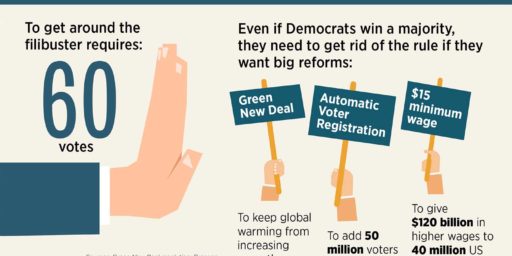The US Senate, Where Down is Up
The filibuster is now so commonplace that it's baked into the expectations.
In my earlier posting “Gabby Giffords on the Gun Lobby,” I made several errors, since corrected, mischaracterizing the failure of the supporters of Senator Feinstein’s bill to get 60 votes to invoke cloture to end a virtual filibuster as a “supermajority” the other way. Normally, that wouldn’t prompt a second post calling attention to the fact. But the events that got me there strike me as interesting.
This morning, scanning to see what had been posted here since I last checked, I came across Doug’s post “‘Assault Weapons” Ban’ Goes Down By Decisive Margin.” My initial instinct was that, no, it had not gone down by a wide margin but rather it failed to garner a supermajority in favor. Yet, the lede of the story in The Hill on which it was sourced was “The Senate rejected implementing an assault weapons ban Wednesday on an 40-60 vote.” I checked a handful of other stories and they all reported it roughly the same way. Thus, I presumed that I was wrong. That, in fact, there had been an up-or-down vote and 60 Senators voted against it.
But, no, the vote was on cloture and it only got 59 votes—one short of the required 60 but 9 more than a majority—and so the measure died.
So this is where we are: The filibuster, which just a few years ago was a rare parliamentary device to ensure that hugely controversial legislation couldn’t be rammed through on a slim majority, is now so commonplace that it’s baked into the expectations. Reporters treat the fact that it now takes a 60 vote supermajority to do damned near anything in the Senate as a given and report that score backwards.
Philip Bump, writing for The Atlantic Wire, notes that the practicalities are even worse: “The Gun Bill Blockers Only Represent 38% of America.”
A Senate filibuster, as it is commonly practiced, allows any senator to speak indefinitely on any bill. If 40 of his or her colleagues vote to end the filibuster (known as “cloture”), the legislation can move forward. If not, it’s essentially defunct. We compiled data comparing state population, yesterday’s Senate vote, and the 2012 election to put together a portrait of how senators representing only a fraction of the country could ensure that no bill advances.
First, we looked at each state’s population, using July 2012 population estimates from Wikipedia. The darker the blue, the higher the population.The twenty-one smallest states
Then we isolated the 21 smallest states. If every senator from each of these states were to oppose cloture on any given bill, they could maintain the filibuster indefinitely.
Those states have a population of about 32 million Americans — which is just over ten percent of the country. And about six million fewer than live in California.
[…]
Breaking out the population of the states that backed the filibuster (and splitting it in half if only one senator backed cloture), we see that 37.7 percent of America, represented by 46 senators, blocked the background check compromise.
Of course, none of this is new. The Framers designed a system where the small states had disproportionate power and the Senate has long allowed a dedicated minority to stop or at least delay a vote.
I’m not particularly outraged about the outcome in this particular case. If we’re going to have a filibuster, a very contentious bill being rushed through in reaction to an emotional crisis is what it’s for. And, even though I broadly support the bill that was defeated, I don’t think the consequences of failing to pass it right now in exactly this form are particularly dire.
But the combination of ever-increasing disparity in state populations, entrenchment of party alignment, and the routinization of the filibuster is a bad one.







I almost agree with the sentiment. For me it’s more like “how can we break the pattern?”
We should be agitated for good governance. That means democratic law, and not minority rule.
It means no Saturday mail delivery, no penny, and on and on.
No, no, no. Harry Reid required a 60 vote threshold on all amendments because he wanted to ensure that no pro-gun amendments could be introduced and passed. If the vote on the Manchin/Toomey amendment only required a simple majority, then any pro-gun amendment (such as expanding concealed carry laws) would have also only required a simple majority.
Apparently the courts won’t ever take up the question, but I’m convinced the filibuster is unconstitutional. When the Framers wanted a supermajority, they wrote it down.
My one thought for a solution to this was to pass an amendment requiring that at each census period, any state with a population of less than 1 million shall be merged into the least populous neighboring state, and any state with a population of more than 10 million shall be divided into two states.
At the time the amendment became effective, North and South Dakota would merge, Wyoming and Montana would merge, Vermont and New Hampshire would merge, Alaska and Washington would merge, and Delaware and Maryland would merge.
California would become four states, Texas three, and New York, Florida, Illinois, Pennsylvania, and Ohio would become two states each.
@Anderson: I tend to agree, although the Framers did give both Houses the ability to set their own rules. I think it’s obviously unconstitutional, though, to require a supermajority in cases where the Framers seemed to specify a mere majority, such as confirming appointees.
@Stormy Dragon: I like the idea. But, of course, there’s pretty powerful incentive for the small states to vote against this. And amending the Constitution is much harder, for good reason, than passing a bill.
Republicans are unwilling and unable to govern.
The filibuster, and their record setting use of it, is their tool to prevent any actual governing.
But as JJ pointed out in another post….they did all collect their $50K from the NRA for not governing.
So it turns out there is money in it for them.
JJ: agreed. I would be interested in any evidence of similar “house rules” of state legislatures or of Parliament in the 18th century.
The reductio ad absurdum would be to imagine a rule requiring, say, a unanimous vote to confirm presidential appointees. If that can’t fly, then I have a hard time seeing the argument that a 60% rule is okay.
@Stormy Dragon: Presumably, one would want the new states to be goegraphically contiguous. So it would only be logical to include Long Island in a state with Staten Island and Manhattan. Are you volunteering to go into the Bronx and tell them that they’re no longer New Yorkers? 😉
Yeah, well, they can make up for it. By filibustering/voting down the CISPA bill that just passed the H.o.R.
Sure, Obama said he would veto it, but I’m not getting my hopes up.
@Stormy Dragon:
What a fabulous idea! I’m sure that the residents of the former Washington (population 6.7 million) wouldn’t dominate the residents of the former Alaska (population 710,000.) I’m sure former Alaskans would be well represented in the new hybrid state goverment.
If 40 of his or her colleagues vote to end the filibuster (known as “cloture”), the legislation can move forward.
If by 40 Mr. Bump means 60 votes this sounds right.
@Septimius:
Well, so what? In NYC, the people of Queens (pop. 2.2 million), Manhattan (pop. 1.6 million), Brooklyn (pop. 2.5 million) and the Bronx (pop. 1.4 million) all dominate the people of Staten Island (pop. 470,000). That’s, y’know, how majority rule works in a democracy — those with the most votes win. Why should 710,000 Alaskans reasonably expect to be on an even footing with 6.7 millions Washingtonians? What makes them so special?
Also note, that the Senate today is far, far more disproportionate than it was in 1790:
“In 1790, Virginia, the largest state, was 12.65 times the size of Delaware, the smallest. In 2010, however, California, the largest state, was fully 66 times the size of Wyoming, the smallest. The Senate is now about five times less proportionate than it was at the country’s founding.”
As a result of this greater disparity and because we’ve added a lot of low population states:
“If senators representing 17.82 percent of the population agree, they can get a majority in the 2013 U.S. Senate. That’s not the lowest that figure has gotten (it hit about 16.8 percent in 1970) but it’s about there. And this doesn’t even take the filibuster into account. The smallest 20 states amount to 11.27 percent of the U.S. population, but if all of their senators band together they can successfully filibuster legislation.”
Courtesy of wonkblog: http://www.washingtonpost.com/blogs/wonkblog/wp/2013/04/18/you-cant-understand-whats-happened-to-the-senate-without-these-two-graphs/
WOW. While the Senate has always allowed for a minority to block legislation, not until relatively recently could such a small minority block legislation.
@Rafer Janders:
That’s precisely the point. I’ll bet Staten Islanders think it sucks that they live on NYC’s garbage dump. I’ll bet had they known what was going to happen 200 years ago, they never would have become one of the 5 boroughs. Just like none of the small states ever would have joined the union unless the Founders had provided some protection in the form of the U.S. Senate.
@Septimius:
The 7100,000 Alaskans have two United States Senators representing them, while 460,000 Staten Islanders have to share two United States Senators with another 19 million New Yorkers. Are Staten Islanders well represented in the US government as compared to Alaskans? If not, why doesn’t that bother you?
Yeah, the media has been behaving this way for most of Obama’s presidency. This is deeply problematic for a number of reasons. First, it often causes the media to portray a few wayward Democrats as the deciding factor in a piece of legislation going down, even though those Democrats weren’t needed for a majority “aye” vote. Second, by making filibusters so routine they’re not even identified and instead are normalized, the media removes any responsibility for the obstructing actors to explain what was supposed to be an exceptional act. In both cases the media is failing to properly inform the voting public who truly blocked a piece of legislation, information which is required for the electorate to reward or punish their representatives in the voting booth.
James Fallows at the Atlantic has been banging this drum for years, and he hit upon the theme again a few days ago:
http://www.theatlantic.com/politics/archive/2013/03/george-orwell-on-the-filibuster/274037/
@Rafer Janders: No. The state of Alaska is represented by two United States Senators. The State of New York is represented by two United States Senators. That’s why we have a bicameral legislature. The Senate represents the interests of the individual states and the House represents the interests of the people. Why not just abolish the Senate if we are going to base everything on majority rule?
@Septimius:
See, what confuses me is that you seem quite concerned about the fate of 710,000 people if they comprise one state, but not at all concerned about the fate of 710,000 people if they are part of some larger group of people within a state.
Good idea. I’m all for it. The Senate is an anachronism, our own House of Lords, and it’s past time to get rid of it and move to democratic majority rule.
@Septimius:
Unicameralism isn’t a necessary consequence of proportional representation. You could still have 2 legislative bodies, but both be based on proportional representation. This is actually what Madison, Hamilton, and Jay supported.
Unlike the house, the Senate would still have longer terms, would still be a smaller legislative body than the house, and it would still have its distinct constitutional functions (consent of appointments, consent to treaties, try impeachments, etc.). As such, it would retain its “deliberative” character as intended, but it would simply be more democratic in its representation.
@Rafer Janders: “Are Staten Islanders well represented in the US government as compared to Alaskans? If not, why doesn’t that bother you? ”
Because unlike Alaskans, they’re not real Americans.
@Septimius:
Indeed, why not? There are plenty of countries that have majority rule, where the will of majority can’t be thwarted by the minority, even with bicameral legislatures(Big example: the UK , “the mother of parliaments”).
In fact, its the rule. Only in the US, does the non-democratic Upper House thwart the rule of the democratically elected Lower House.
@Septimius:
No. The Senate is the Upper Chamber of the Parliament, and the idea of the the Upper Chamber is to be a chamber controlled by somekind of elites, that could balance the Lower Chamber, also known as the house of the people. In Italy, there are seats for life for former presidents, in Australia and Mexico there are national at large senate seats. In the UK, the House of Lords is the Senate.
The idea of “interests of the individual states” is not only inaccurate, it also denotes corruption, because the interest of individual states are mostly economic interests; That´s one of the reasons that agricultural subsidies does exist.
Rather than focusing on the Senate — which isn’t going to change — I think it’s better to look at the current formula for the House. As Steven Taylor has noted in the past, the fact is that the current model of House Representation is extremely disproportionate in its own way. The net result is that lower population states are arguably over-represented there (even those with a single house member).
Part of the reason that votes can’t be mustered to overcome the filibuster is — as James and Doug have pointed out elsewhere — people don’t want to stick their necks out for a symbolic vote — a vote on a measure that even if passed would die in the house.
If you accept that the role of the Senate is to ensure that small states have protection, then it also stands to reason that the house should be where larger population states have say that is truly proportional to their populations.
@stonetools:
1-) Part of the point of having a Upper House is to thwart the democratically elected Lower House. It was the Senate that blocked some dumb ideas(Flag burning amendment, for instance).
2) It can be worse than in the US. The Brazilian Senate(Each state has three senators) is even worse than the US Senate, because the disparities between the least populated state( Roraima, pop. 469.000) and the most populated state(São Paulo, pop 42 million) are even bigger. In fact, more than half of the population lives in just five states, that have 15 senators out of 81.
@Gromitt Gunn:
Don’t have to. Based on current populations, you can put Suffolk, Queens, Kings, Richmond, New York, and Bronx counties in a state and still be about half a million below the cutoff.
@Stormy Dragon:
Oh crap, forgot Nassau county. Hmmm…
Just a few words about the Senate cloture rule.
1. The same concern, “what if they all gang up?” was expressed by the smaller states during the Constitutional Convention. New York, Virginia, and Pennsylvania could form a conspiracy, the smaller states asserted, and dictate what they pleased to the rest of the country by holding among them a majority of votes in the House of Representatives.
It was pointed out that powerful states actually do not form combinations in practice. Rome and Carthage sure didn’t, but fought each other through three brutal wars.
In the same way, the idea that twenty small states are going to band together and form a conspiracy to control the Senate hasn’t happened, isn’t happening, and almost certainly isn’t going to happen. We can all breathe easier on that.
2. The current cloture rule of the Senate may be aggravating, and so far as I know the Cloture Rule has never been so broad and powerful as it is now, but it is as nothing compared to the rule in the House. In the Senate (under current rules), nothing can make its way to the floor without the apporval of 60% of that body. But in the House, one member alone, out of 435, controls what goes on the floor: the Speaker is that powerful. The only way for something to make its way to the floor without the Speaker’s approval is for more than half that body to put their names to a petition that the legislation be brought: a very high bar that is almost never met.
In view of this last-mentioned procedural idiosyncracy, one can seriously wonder whether the House is any more democratic than the Senate, and this despite the fact that it was expressly established to be so.
@Justinian:
The point is not a conspiracy of small states. The point is that small states tend to be rural states that have the same interests. So, policy making is biased towards these states. That explains the agricultural subsidies in the United States.
The Constitution guarantees each state two senators. What we should do is grant every state one additional senator for each multiple of, say, 10 times the population of the least populous state. So Alaska still keeps its two senators, but Georgia (2010 population of somewhere between 7 and 8 million) gets one additional senator. New York gets two or three additional senators, and so forth.
@Stormy Dragon: They can always join Rhode Island.
Is it any wonder anything gets done in Washington. WE need to change all the rules so we can stop wasting everyone’s time and money
@Septimius: For the time being I’m in favor of abolishing The House.